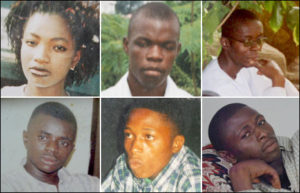Ebuka Onyeji
Fifteen years after six young Nigerians were murdered by police officers, the man accused of ordering the killings remains free.
The families of six young Nigerians killed unlawfully 15 years ago by the police in the nation’s capital, Abuja, say they want the matter revisited now that the country’s attention is on solving wanton police brutality.
The #EndSARS movement has been on for over two weeks, with street protests across the country demanding an end to police brutality.
The families of the Apo Six, as the victims of the 2005 killings became known, say they want those responsible for the killing punished and compensation paid for the extrajudicial deaths of their lives ones.
Apo Six
Danjuma Ibrahim is not a member of the newly disbanded Special Anti-Robbery Squad (SARS) widely accused of vicious killings and endless police brutalities.
He is the police official, (a Deputy Commissioner of Police (DCP) at the time) who ordered the shooting of a man, his fiancé and four of his friends 15 years ago.
In one of the most heinous extra-judicial killings Nigerians can remember, Mr Danjuma, on the night of June 7, 2005, unleashed trigger-happy-cops on six innocent youth who have come to be known as the “Apo Six” after his love advances on Augustina, the only female among them, were rebuffed.
The incident took place at Gimbiya street, Area 11 in Abuja. The night was meant to be a night of merrymaking for Ifeanyi Ozor, Chinedu Meniru, Augustina Arebu, Anthony Nwokike, Paulinus Ogbonna, and Ekene Isaac Mgbe.
But Nigerians would later be riveted with the horrific news of their deaths in the hands of the policemen.
The police had claimed that the victims, aged between 21 and 25 years, were members of an armed robbery gang that had opened fire on the officers when accosted at a checkpoint.
But a judicial panel of inquiry set up by former President Olusegun Obasanjo found the police account to be false and recommended the trial of six officers involved for extra-judicial killings.
Mr Ibrahim and five other officers, Othman Abdulsalami, Nicholas Zakaria, Ezekiel Acheneje, Baba Emmanuel, and Sadiq Salami were indicted.
Twelve years later on March 9, 2017, after a protracted case, the FCT High Court presiding judge, Ishaq Bello pronounced the six victims, innocent.
He convicted and sentenced two officers to death but said there was not enough evidence to convict Mr Danjuma and two others. One other officer remains at large.
The families of the victims, who saw the judgement as the height of injustice, have been trying to appeal but their efforts have been frustrated by the justice ministry.
#ENDSARS
Spearheaded by young Nigerians, the #EndSARS protests which started two weeks ago have become widespread national demonstrations over a longstanding pattern of police brutality before and after the ‘Apo six’ incident.
The protests gained support from international figures, including sport and entertainment celebrities but started turning violent after hoodlums began to attack protesters in Lagos and Abuja. And days after the protests started, the police were still brutalizing the protesters.
The government has announced some concessions, including the dissolution of the notorious SARS unit and the constitution of judicial panels by a number of states to investigate police abuses. But protests continued, largely grounding Lagos, Abuja and parts of Edo State as demonstrators demanded more concrete actions.
